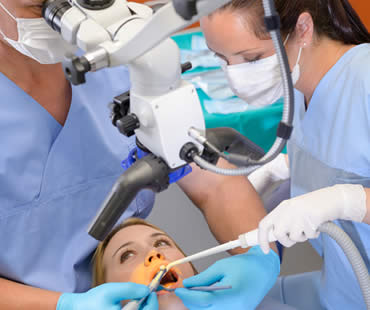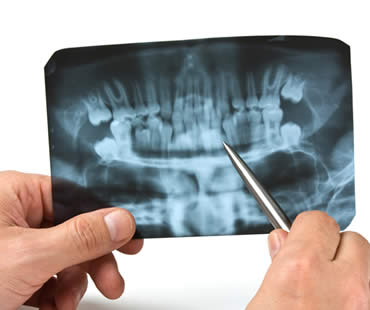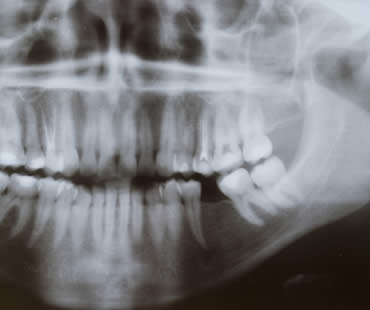
There are a number of reasons people choose to get dental veneers, which are able to hide all kinds of tooth problems. These thin porcelain shells are bonded to the front surfaces of your teeth and can transform an embarrassing smile into one to fill you with pride. One of the most common reasons that many patients opt for veneers is to hide discolored teeth.
No matter what the cause for it, teeth can lose their bright white shine over time. It can be from consuming foods and drinks that tend to stain teeth, such as red wine, coffee, berries, sodas, and other culprits. Or it can be side effects from medications, including the antibiotic tetracycline which can cause severe tooth discoloration if taken during a child’s formative years. Poor oral hygiene can also contribute to yellowed teeth, as well as tobacco use. Aging in general tends to discolor teeth too.
If your teeth show the effects of staining or yellowing, and you’d like to get that healthy youthful glow back, porcelain veneers are a good option. They provide a unique advantage of never staining, so they look like new the entire time you have them. With proper care, your veneers should last for decades or even a lifetime. That means a bright, white smile that won’t deteriorate!
Another great benefit about veneers is that they provide an instant improvement to your smile. As soon as they are placed, your smile will be transformed. If you have concerns about what they will look like, many dentists are able to use computerized photo imaging technology to give you an accurate idea of what to expect. This may alleviate any hesitations about veneers being the right solution to hide your discolored teeth. Ask your dentist today about the possibility of getting veneers to improve your smile.
We treat patients from Lawrence MA and the surrounding area

Many people are afraid of getting their wisdom teeth out based on horror stories from the internet or scary tales exaggerated by others. The best way to fight these fears is to learn more about the procedure and what you can truly expect.
The first thing to know is that wisdom teeth extractions are the most common oral surgeries. Most oral surgeons perform an average of one a day, so that experience has provided skill and expertise in the procedure. Also, you will be under some degree of anesthesia. Whether it’s general anesthesia or even just nitrous oxide (laughing gas), you won’t feel anything during the surgery and won’t remember what happened afterwards.
One common fear is the bleeding associated with wisdom teeth extractions. While there is some bleeding from the site after surgery, it is usually easily controlled by following the after-care instructions. You will be told to gently bite on gauze in that area of your mouth, and change it frequently. Propping your head up will help limit the bleeding also.
Swelling is another reason some fear this surgery, but it should be gone in just a few days. You can hold ice packs to the outside of your cheek off and on for the first 24 hours to decrease the swelling.
The recovery process should go smoothly if you follow your oral surgeon’s advice. Have someone drive you to and from the appointment, and eat soft foods at first. Do not use a straw for the first few days, and avoid touching the area with your fingers or tongue. Also, do not smoke for at least the first 24 hours following surgery.
While there are risks associated with any surgery, most wisdom teeth extractions are without complications and recovery is complete in just a few days to a week. The benefits of having the surgery outweigh the risk of ignoring your dentist’s advice to have your wisdom teeth removed.
We look forward to seeing you in our Lawrence MA dental office

Wisdom teeth got their name because they are the final teeth to develop, usually in the late teens to early twenties, at a time when a person becomes fully mature or “wise.” Wisdom teeth are the third and final set of molars in the very back of the mouth. Most people have four total (two upper and two lower), but others never develop them at all. Wisdom teeth can be a valuable chewing aid, but often they are poorly aligned or don’t develop properly.
How do I know if I have them?:
Unless you start to feel them breaking through, you may not know whether you have wisdom teeth or not. Ask your dentist to examine you to see if these teeth are healthy and properly positioned. An x-ray may be required, and your dentist may refer you to an oral surgeon to be evaluated further.
Do wisdom teeth hurt?:
You don’t always feel anything with your wisdom teeth, but sometimes they are very bothersome. You may experience pain when they erupt in awkward positions, especially if the teeth rub against your mouth. Other problems include stiffness in the area, infected swelling of the gums, tooth decay, gum disease, and tooth crowding.
Why remove them?:
Your dentist or oral surgeon might suggest that your wisdom teeth be extracted. They can often predict if your wisdom teeth may crowd or damage other teeth, your jawbone, or nerves. Sometimes removal is appropriate before problems arise, in an effort to avoid more complicated or painful extractions later. Removal is usually simpler and less risky in young people. If your wisdom teeth are not extracted, it’s important for your dentist to continue monitoring them because problems may develop later.
What does impacted mean?:
Wisdom teeth may be impacted, which means they are enclosed in the soft tissue or jawbone or they only partially erupt through the gum. Impacted wisdom teeth are almost always removed to avoid risks of infection, tooth decay, and gum disease.
We look forward to seeing you in our Lawrence MA dental office

Whether you are a teenager or an adult, you may have pain associated with your wisdom teeth. In a perfect situation, these back molars erupt last and fit right into your mouth without problems. Many people are not so lucky, however. It is common for these teeth to attempt to come in, but have nowhere to grow in the space where your other teeth are already established. This can result in a very painful toothache.
The first step you should take is visiting your dentist, where x-rays will be taken to see exactly what is happening in your mouth. The x-rays will be examined to determine the angle the teeth are growing, how much room is available for them to develop, and if there is any infection present. Depending upon the examination results, surgery may be necessary to remove your wisdom teeth.
Your dentist will look for signs that indicate your wisdom teeth need to be removed. The main indications for tooth removal include:
- A tooth embedded in your gums
- A tooth that is only partially erupted
- The presence of a cyst around the tooth
- A tooth growing in an awkward angle
If your dentist recommends removal, it is usually suggested to have it done as soon as possible to avoid further problems and continued pain. Sometimes it is necessary to remove only a single tooth, and in other cases multiple teeth may need to go. The complexity of the removal depends on whether the teeth are embedded, the angle of growth, and other issues. Your dentist will advise you on the safest and most effective plan for taking care of your wisdom teeth and getting rid of the pain.
We look forward to seeing you in our Lawrence MA dental office

Your “third molars”, which are the molars in the very back that are the last to erupt, usually start to appear during the late teen years. They may not emerge for everyone, but when they do show up they are often problematic. Most people’s jaws don’t have room for them, and sometimes they are impacted and unable to erupt at all. Here are some common symptoms that you can watch for so you’ll know when your wisdom teeth might be the culprit.
The main thing many people notice is pain as their wisdom teeth develop. These teeth in the far back of your mouth, often two upper and two lower teeth, are very unpredictable. Sometimes they erupt sideways or crooked, causing your other teeth to become misaligned or overcrowded. If your wisdom teeth erupt, you might see them poking through your gums and creating an area of tenderness, inflammation, and redness. It can be painful to eat and brush your teeth. When wisdom teeth pain is very bothersome, dentists usually recommend removing them.
You may be one of the lucky people who don’t experience wisdom tooth pain. However, there are a host of other symptoms associated with these teeth. Some of these include:
- Sore throat
- Fever
- Difficulty swallowing
- Facial swelling
- Nausea
- Pus
- Lymph gland swelling
- Inflamed gums
- Bad breath
- Problems chewing and brushing
- Cysts around impacted wisdom teeth
Any of the above symptoms warrant a visit to your dentist. Even if wisdom teeth aren’t the cause, you should find out what’s behind these problems. If your dentist determines that your wisdom teeth are impacted, you will be advised to have them surgically removed usually by an experienced oral surgeon. Wisdom teeth extraction is a common procedure, so you shouldn’t hesitate to follow your dentist’s recommendation to take care of any problems with these teeth. Once you have recovered from this surgery, you will be glad the symptoms are gone and you no longer have to worry about your wisdom teeth.
If you need a dentist in Lawrence MA contact us today

Tooth pain can be one of the most uncomfortable types of pain there is. It can make your whole jaw and head ache, interfere with eating, and cause your teeth to be more sensitive. One common reason for a toothache is your wisdom teeth, which are the molars in the very back of your mouth that develop last. Sometimes they don’t even erupt, but they can still be there under your gums causing trouble. If you experience pain related to wisdom teeth, here are some suggestions.
Make an appointment to see your dentist as soon as possible. This way you can find out for sure if your wisdom teeth are to blame for your pain, and decide the best treatment plan for your situation. A dentist examination, which may include x-rays, is the best way to determine exactly what’s going on with your teeth. You may not even be able to see your wisdom teeth, but they might be growing improperly under your gums. Often, wisdom teeth need to be extracted to avoid continued pain or worsening condition. Luckily, wisdom teeth extraction is a common procedure that your dentist or oral surgeon is very familiar with, and can provide you with great treatment that will end up relieving your pain.
While waiting for your dental appointment, try applying an over-the-counter numbing gel such as Oragel. This may help relieve your pain at least for a short time. Also, taking non-prescription pain medicines should help. Acetaminophen and ibuprofen are both good choices to try, especially to subdue the pain when you want to sleep.
Remember that prevention is often the best way to avoid dental pain. Brush your teeth at least twice a day, and floss every day. See your dentist regularly for checkups, because problems with wisdom teeth can sometimes be spotted before you ever begin to feel any pain associated with them. This allows you to deal with the problem before you have to endure a toothache.
Our dental office is located in Lawrence MA










